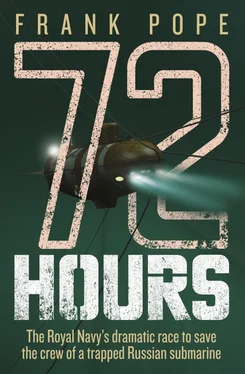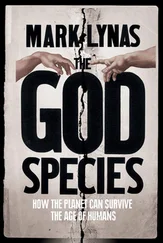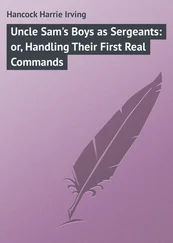Chapman’s own ordeal back in 1972 had lasted 84-and-a-half hours. For him the clutching cold, the rancid smells and the killer headache were only too clear a memory. At the moment of his own rescue, when the submersible Pisces had finally begun to be lifted to the surface, he recalled that his mind had been so addled by the carbon dioxide that he’d been irritated at the disturbance.
As the team were securing Scorpio and her systems for the voyage back to Petropavlovsk, Podkapayev arrived and asked them to join him in the officers’ mess. They agreed to join him once they’d finished the lashings – they didn’t want to lose any of their equipment now, especially with Riches’ favourite customs officer doubtless waiting for them at Elizovo airport, checklist in hand.
Up in the officers’ mess the Ship’s Master had pulled out all the stops. A huge spread of cheese, meat and pickles had been arrayed across the wardroom table, along with five or six different brands of vodka, evidently rounded up from various crewmen’s cabins. The remains of Nuttall’s single-malt whisky were added to the lineup. With the entire British team, the Americans and the Russian escorts and translators and some of KIL-27 ’s officers crammed into the small space, the waiting shot glasses were filled with vodka and handed around. When everybody had one, the Master raised his vodka and gave a long, rambling toast, looking each of the UK team in the eye as he did so. Holloway translated his words; they were a formal tribute to the professionalism of the British team.
When he was done, everyone tipped back the warm vodka. Their throats were still burning when the bottles were sent around to refill the glasses. This time it was Podkapayev who made the toast, praising in his booming voice the friendship that had stretched from the Gulf of Taranto to Petropavlovsk. He then announced that thanks to Submarine Rescue Service the crew of AS-28 had a new birthday now: 7 August. Finally he raised his glass above his head.
‘Za náshoo dróozhboo.’
‘To our friendship,’ the team cheered back.
Then Captain Holloway was invited to propose the third toast. It was a special honour to be given the third toast, Holloway explained, and a reflection on their achievement as a team. There could be no choice other than the Russian Navy’s traditional third toast, which had a particular poignancy on this occasion. He cleared his throat to quieten the room, and raised his glass, freshly topped off with vodka once more. ‘To those at sea,’ he said, catching the eyes of all the British team. He then repeated it in Russian, collecting the gazes of all the Russians in the mess, uniting everyone in the room in the memory of both the living and the lost. Sometimes this was a sad toast, commemorating those who had died and whose bodies lay in the deep, but this time it was the exact opposite.
‘To those at sea,’ everyone repeated.
With that third vodka, a sudden wave of tiredness washed over Riches, followed by a surge of emotion. They’d done it. They’d pulled it off.
Conversations were already sparking up around the mess, the vodka helping the three nations to communicate without the help of a translator. Podkapayev – who had morphed back into the jovial character who’d visited the Mediterranean earlier in the summer – announced that he’d always known the men would be rescued on the Sunday. It was the 7th, there were seven men on board, and it was his lucky number. It made perfect sense, he said.
A Russian officer sidled up to Dave Burke, the ex-Navy officer on the UK team, and leaned in close.
‘I know what you do,’ he said.
‘I’m sorry? What do you mean?’ replied Burke, confused.
‘I know you. You watch. You spy like me. You watch people.’
‘I’m not! I’m not a spy!’ protested Burke, but the Russian just gave him a conspiratorial smile and slipped away.
When the other vodka bottles were all empty, the party turned to the last, chilli-flavoured bottle. Soon everyone was getting emotional. Pete Nuttall recounted his recent traumatic experience of having been too late with the lifeboat to save a father and son trapped by the tide. With this rescue now behind him, the previous experience overflowed in a sudden flood of tears. The celebration wouldn’t finish for another six hours.
Sunday, 7 August
08.00 UK – 11.00 Moscow – 20.00 Kamchatka
Petropavlovsk Naval Base
The Defence Minister, Sergei Ivanov, was keen to smooth the dents to national pride when he stepped ashore for his news conference. ‘I would like to congratulate all Russians,’ Ivanov began, his hands behind his back, before talking through an outline of the rescue. ‘The guidance for the work was carried out by a Russian Underwater Vehicle called Tiger,’ he said, before blaming the thickest of the cables on a poacher’s fishing net. As Guzel Latypova and other local journalists were quick to point out, the Tiger was in fact a British-made machine, bought in the wake of the Kursk five years before. What’s more, the thickest cable on the site was assuredly not from one of the fishing nets, but was the air-filled hose that appeared to Riches as being used to service the underwater array.
‘It is symbolic that as soon as we lifted the vehicle the sun appeared in the sky and when we started to leave, killer whales swam alongside,’ the minister concluded, saying the crew would soon be arriving at the harbour of the Bogorodskoye Lake in Petropavlovsk-Kamchatsky.
Later that evening, the Nanutchka-class missile attack boat Moroz pulled up to a dockside thronging with reporters and television cameramen desperate for a glimpse of the crew of AS-28. Captain Valery Lepetyukha was not on board, having transferred aboard the command ship Alagez to see his wife and talk to the Defence Minister. As a result, it was Slava Milachevsky – wearing a dry set of overalls, a jacket and his naval cap with its gleaming gold centre-piece directly above his eyes – who led the still stunned looking group of crew members ashore. As he approached the gangplank at the stern, Milachevsky saw the assembled press pack. With the pictures being transmitted on live television, he stumbled to a halt and pulled an uncertain salute. Bolonin, walking behind him, almost crashed into him.
With a half-smile fixed on his face, Milachevsky then continued, walking down the gangplank first. In Lepetyukha’s absence he was introduced as the senior officer, sparking a furious reaction in the Russian press over putting such a young man in charge.
Guzel Latypova was at the very front of the pack with her microphone ready and got the first question in.
‘How do you feel?’ she asked.
‘I’m fine,’ he replied. No one was allowed to ask any other questions, and the crew were quickly herded away to a waiting military ambulance.
During the hustle another sailor, his bloodshot eyes matching his reddish hair, also repeated the mantra. ‘I’m fine,’ he said. ‘At least now I’m fine. It was cold, very cold. I can’t even describe it.’
Once all six men were inside the ambulance, its dark green doors were slammed shut and the van tore off towards the hospital. The relatives of the sailors had not been allowed on the dockside, presumably to prevent tearful reunions being broadcast across the nation, but many were clustered at the gates of the base. The ambulance slowed but did not stop, leaving wives and mothers to cry out and clutch at the windows in vain.
Yelena Milachevskaya was at home, glued to the television along with her sister and her children, and when they saw their Slava walking down the gangplank they all leapt up and started bouncing around the room. The footage of Slava was being played over and over again on the news, and all his loved ones yelled each time, laughing hysterically at his blue nose, calling him ‘Grandfather Frost’.
Читать дальше












